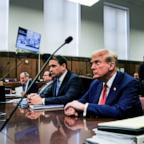Just Over a Month Out from Election Day: Matt's Magnificent Seven
Seven fascinating developments as Election Day gets closer.
— -- Approaching the final 30 days of an unprecedented presidential election, let us examine seven fascinating developments. They may not be exactly the Magnificent Seven (as the movie in theaters is called), but it is Matthew's seven (and sorry for all the damage of my namesake hurricane and blessings to all affected).
1. For the first time ever in a presidential race we have two major-party candidates disliked and distrusted by a majority of the country. This has never happened before. It has made for an ugly conversation and will also make for an even bigger problem on Nov. 9 when there is no mandate for whoever wins. In the aftermath of this election, the level of disgust with the political party duopoly will only grow, and we will see a rise of independents for local offices.
2. As I have often mentioned, millions of dollars have been spent on political advertising in the presidential race with little to no effect. When examining states where campaign TV ads have aired and those where they haven't, there is no discernible effect. Political consultants with a stake in ad buys are still driving these inefficient and ineffective decisions. While ads work to a degree in down-ballot races, in the presidential election they are a total waste of money.
3. Debates matter. They are the only scheduled events left in the campaign that can have a real impact. Hillary Clinton made the wise choice of preparing and resting for the first debate, and it paid off with a strong victory. Donald Trump dropped in the polls afterward, and Clinton has now taken a small but significant lead of 4 points or so. The Electoral College is back to leaning heavily in her favor, polls show. The second presidential debate on Sunday matters hugely to Trump. If he wants to regain momentum, he needs a win.
4. The biggest change registered in the polls since the first debate is that Clinton's voters are now just as enthusiastic as Trump's. That is the major impact of the Clinton debate victory and is a big change from a few months ago when Trump's voters were around 10 points more enthusiastic than Clinton's. Enthusiasm in the two camps is now even. Still, the level of excitement among voters as a whole is the lowest in a generation and is much lower than in 2012, 2008 or 2004. My expectation is that voter turnout will set a record, but as a percentage of the number eligible to vote it will be lower than in most recent presidential elections.
5. Undecided voters are increasingly likely to sit out Election Day and not vote. They represent about 6 percent of likely voters. Notably, 80 percent of undecideds have an unfavorable view of both major candidates at this time. I can't see that changing much going forward, so there is a strong likelihood that these voters will just take a pass on casting a ballot in November. This means that whichever candidate is running behind going into Election Day will find it nearly impossible to catch up due to a lack of change among the undecided. There also is no evidence of a secret or hidden bloc of Trump voters. In the GOP primaries, the number of votes Trump won in each state was nearly exactly what he polled going into the election.
6. Clinton will have a slight advantage with the Electoral College if the race is very close. The count of electoral votes in her column is more solid than Trump's, and many of the key states lean in her direction. In a dead-even popular vote, Clinton would carry the Electoral College. By my back-of-the envelope calculation, Trump has to win nationally by at least 1.5 million votes in order to carry the Electoral College. There is a slight possibility of Trump winning the national vote but losing the Electoral College. There is really no possibility of that happening with Clinton.
7. In a fascinating development, there is an inverse relationship between the top of the ticket and U.S. Senate races. When Hillary rises in the polls, so too do many of the GOP candidates running for the Senate. When Trump rises, many of the Democratic candidates for Senate do better. It is as if a small percentage of voters have figured out they want a senator from the opposite political party as the president. So we have a wave developing, but it is set to crash on the other side of the beach.
There you have it.
Matthew Dowd is an ABC News analyst and special correspondent. Opinions expressed in this column do not necessarily reflect the views of ABC News.
Watch FULL LIVE COVERAGE of the second presidential debate, co-moderated by ABC News’ Martha Raddatz, at 9 p.m. ET on Sunday, Oct. 9. Coverage and analysis of the debate will begin on ABCNews.com/Live at 7 p.m. ET.




